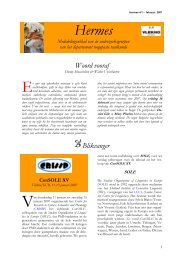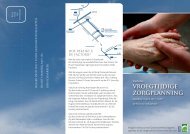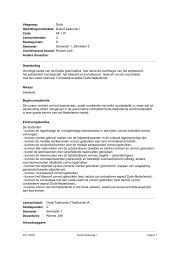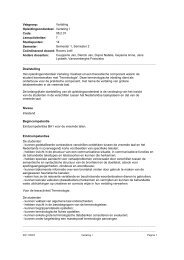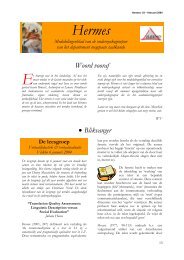HUB RESEARCH PAPER - Hogeschool-Universiteit Brussel
HUB RESEARCH PAPER - Hogeschool-Universiteit Brussel
HUB RESEARCH PAPER - Hogeschool-Universiteit Brussel
You also want an ePaper? Increase the reach of your titles
YUMPU automatically turns print PDFs into web optimized ePapers that Google loves.
Process consultation revisited 27<br />
processes attention should be given to how relational practices, with a certain quality, are<br />
assembled. High quality relational practices that aren’t assembled constructively are not<br />
sufficient to bring about sustainable organizational and social change. Simultaneous attention to<br />
the quality of separate relational practices, the relational embeddedness of practices, and the way<br />
practices are assembled is necessary. This seems especially relevant in all settings of<br />
organizational and change and development in which relational practices have to be (re)created<br />
and assembled (also with stabilized ‘daily’ relational practices) to bring about new<br />
interdependencies, new knowledge, new tasks and roles, new memberships, new communities of<br />
practice, new structural arrangements, etc.<br />
A focus on relational practices for sustainable organizational and social change processes<br />
can be considered as a recent actualization of the inspiration of the founders of organizational<br />
psychology. In the sixties, organizational psychology developed from the theoretically and<br />
practically strongly developed domain of group dynamics (Schein, 1965). The training group<br />
tradition generated the process consultation practices and principles, and developed further into<br />
the organizational development methods (cf. Addison-Wesley series on Organizational<br />
Development, edited by Edgar Schein and Richard Beckard). The seventies saw a worldwide<br />
spread of these organizational approaches, but from the eighties on, what was called the value-<br />
laden basis of organizational development (Neilsen, 1984) became a hindrance for consulting<br />
and research practices, looking mainly for even more global forms of competitive advantage.<br />
The functional restructuring turn in the nineties could not preserve so well the process<br />
consultation orientation, and the crucial role of values and vision on organizational change<br />
theorizing became even polarized (Beer & Nohria, 2000).



